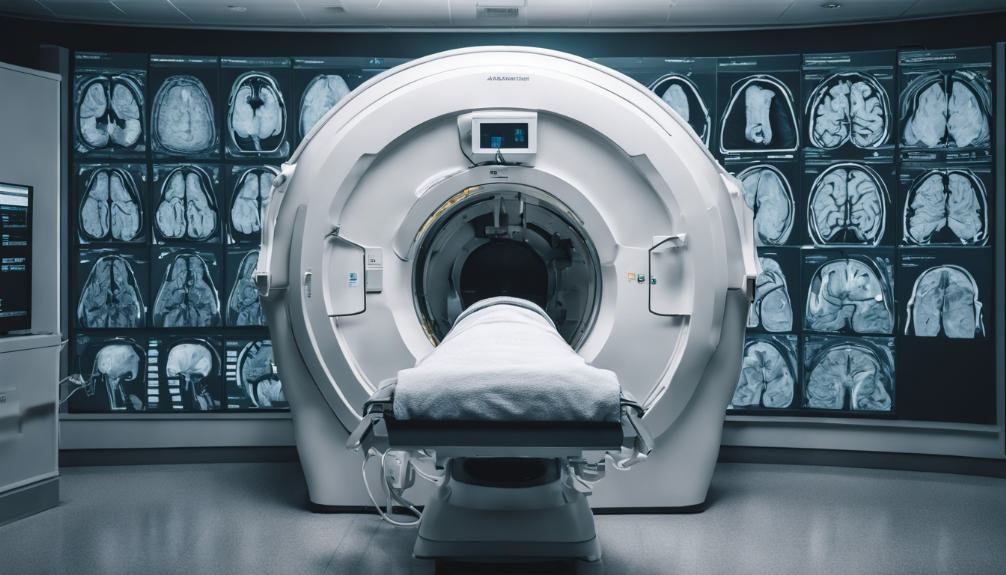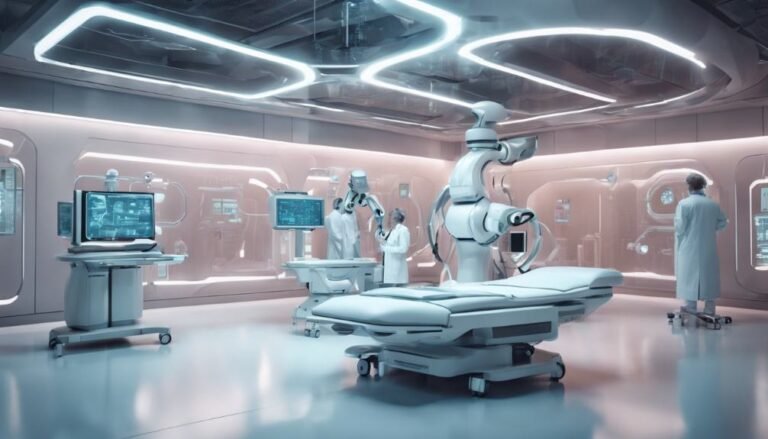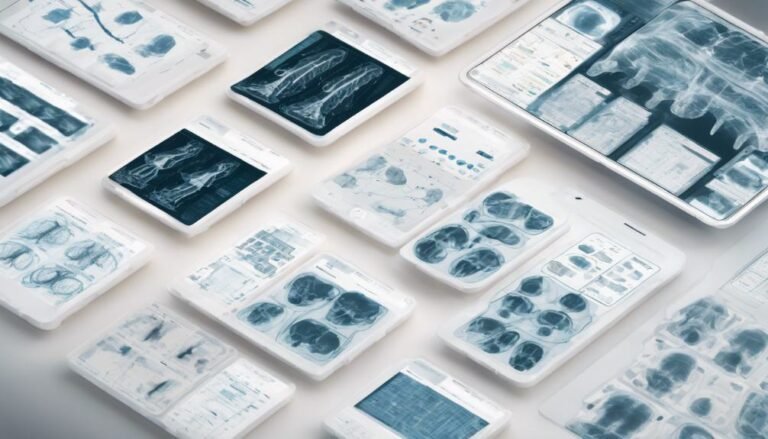AI in MRI Analysis
Did you know that AI-powered MRI analysis systems have shown a 30% increase in accuracy compared to traditional methods? Harnessing the potential of artificial intelligence in interpreting MRI scans not only expedites the diagnostic process but also opens doors to a domain of possibilities in personalized medicine. The intricate dance between technology and healthcare unfolds fascinating implications for the future of medical imaging, where AI continues to shape the landscape of precision medicine.
Key Takeaways
- AI enhances MRI analysis by automating processes.
- AI algorithms detect abnormalities in MRI data efficiently.
- AI improves diagnostic accuracy through advanced image analysis.
- AI streamlines interpretation processes, saving time and reducing errors.
- AI-driven predictive analytics optimize personalized treatment strategies.
Evolving Role of AI in MRI
AI is revolutionizing MRI analysis by automating processes and enhancing diagnostic capabilities. Recent AI advancements have greatly impacted the field, leading to a wide array of clinical applications. AI algorithms can process vast amounts of MRI data quickly, aiding in the detection and characterization of abnormalities that might be challenging for human interpretation alone.
Moreover, with the integration of AI into MRI analysis, ethical considerations and data privacy become essential aspects to address. Ensuring that patient data is handled securely and with confidentiality is paramount. Healthcare providers must adhere to strict regulations to safeguard patient information and maintain trust in the system.
As AI continues to evolve in MRI, maintaining ethical standards and data privacy protocols will be vital to uphold the integrity of diagnostic processes.
Enhancing Diagnostic Accuracy
To enhance diagnostic accuracy in MRI analysis, advancements in AI technology have provided a significant boost in the detection and characterization of abnormalities. Through advanced image analysis techniques and machine learning algorithms, AI systems can now identify subtle patterns and variations that might be challenging for human radiologists to discern.
Machine learning algorithms can efficiently process vast amounts of MRI data, quickly recognizing anomalies or changes in tissue structures that could indicate diseases or conditions.
These AI systems can segment different tissues, organs, or lesions within MRI scans with high precision, enabling more accurate diagnosis and treatment planning. By training on large datasets, AI algorithms continuously improve their ability to differentiate between normal and abnormal findings, reducing the chances of misinterpretation.
Furthermore, AI tools can assist radiologists in identifying early signs of diseases, potentially leading to earlier interventions and improved patient outcomes. The integration of AI technology in MRI analysis not only enhances diagnostic accuracy but also helps optimize healthcare resources by streamlining workflows and reducing diagnostic errors.
Streamlining Interpretation Processes
Efficiently organizing and optimizing the workflow for interpreting MRI scans is essential in maximizing the benefits of AI technology in diagnostic radiology. One key aspect of streamlining interpretation processes is automating reporting. By implementing AI algorithms that can automatically generate structured reports based on the analysis of MRI images, radiologists can save significant time and maintain consistency in reporting standards. This automation not only speeds up the reporting process but also reduces the chances of human errors in transcribing findings.
Moreover, integrating AI tools for automating reporting can enhance the overall efficiency of the diagnostic workflow. These tools can assist in standardizing terminology, formatting reports, and highlighting critical findings, facilitating quicker decision-making processes for healthcare providers.
Predictive Analytics in Disease Management
You can leverage AI-driven predictive analytics to enhance disease prognosis accuracy, allowing for more tailored treatment plans.
By utilizing advanced algorithms, healthcare providers can optimize therapeutic strategies based on individual patient data, leading to improved outcomes.
Additionally, the efficiency of patient monitoring can be greatly enhanced through the continuous analysis of health metrics, enabling proactive interventions and personalized care.
Disease Prognosis Using AI
When implementing AI for disease prognosis, predictive analytics plays an essential role in enhancing disease management strategies.
Prognostic modeling, an important aspect of disease prognosis, involves utilizing AI algorithms to predict the progression of a disease in an individual based on various factors such as medical history, imaging data, and biomarkers.
Deep learning techniques, a subset of AI, have shown significant promise in improving prognostic accuracy by analyzing complex patterns within medical data to forecast disease outcomes.
By employing deep learning algorithms, healthcare providers can leverage vast amounts of patient data to develop more accurate predictive models for diseases. These models not only aid in early detection but also enable personalized treatment plans based on individual risk assessments.
Additionally, the integration of AI in disease prognosis helps optimize patient care by identifying high-risk individuals who may benefit from targeted interventions or closer monitoring.
Treatment Optimization Strategies
Utilizing predictive analytics in disease management allows for the optimization of treatment strategies through the analysis of patient data and the development of personalized intervention plans. By leveraging treatment efficacy and data optimization, clinical decision making can be greatly enhanced through AI integration.
Treatment efficacy refers to the ability of a specific treatment to achieve the desired outcomes in patients. Data optimization involves the efficient collection, processing, and utilization of patient data to tailor treatments effectively.
Clinical decision making is a critical aspect of treatment optimization strategies. AI integration enables healthcare professionals to make informed decisions based on predictive analytics, leading to more precise and personalized interventions.
Through the analysis of vast amounts of patient data, AI systems can identify patterns and trends that aid in determining the most effective treatment approaches for individual patients.
Patient Monitoring Efficiency
Enhancing patient monitoring efficiency in disease management involves leveraging predictive analytics to optimize the effectiveness of interventions through real-time data analysis. By implementing real-time monitoring systems, healthcare providers can continuously track patient data, allowing for timely adjustments to treatment plans based on dynamic changes in health status. This proactive approach enables swift identification of potential complications, facilitating early intervention and improved patient outcomes.
One key aspect of enhancing patient monitoring efficiency is data integration. By integrating data from various sources such as electronic health records, wearables, and imaging results, a thorough patient profile can be created. This integrated data allows healthcare professionals to gain a holistic view of the patient's health status, enabling more personalized and targeted interventions.
Additionally, predictive analytics can be applied to this integrated data to forecast potential health risks or progression of diseases, aiding in the development of proactive care plans.
Personalized Treatment Approaches
You can now explore the implementation of tailored treatment plans and individualized care strategies utilizing AI in MRI analysis.
These approaches aim to optimize patient outcomes by customizing medical interventions based on specific imaging data.
Tailored Treatment Plans
Tailored treatment plans in MRI analysis involve customizing medical interventions based on individual patient characteristics and imaging results. By utilizing personalized interventions and precision medicine techniques, healthcare professionals can develop treatment strategies that are specifically tailored to each patient's unique needs.
Through advanced AI algorithms, MRI scans provide detailed insights into the patient's condition, allowing for the identification of specific disease markers and patterns that guide treatment decisions. This precise analysis helps in determining the most effective course of action, whether it be medication, surgery, or other therapeutic interventions.
Moreover, the integration of AI in MRI analysis enables the creation of treatment plans that take into account factors such as genetic predispositions, previous medical history, and real-time imaging data. This holistic approach ensures that patients receive the most suitable and effective treatments, thereby improving outcomes and reducing potential risks associated with standard treatment protocols.
Individualized Care Strategies
Customized care strategies in MRI analysis involve tailoring medical interventions to individual patient characteristics and imaging results, paving the way for personalized treatment approaches that optimize patient outcomes. Personalized interventions based on MRI data are a cornerstone of precision medicine, enabling healthcare providers to deliver targeted therapies that address specific patient needs.
By utilizing AI algorithms to analyze MRI scans, healthcare professionals can identify subtle variations in tissue characteristics, disease progression, and treatment response, allowing for the development of tailored care plans.
Precision medicine in MRI analysis encompasses a range of techniques, including radiogenomics, radiomics, and machine learning, which together enable the extraction of valuable insights from medical imaging data. These personalized approaches not only enhance diagnostic accuracy but also play a significant role in guiding treatment decisions.
Integration of Machine Learning
Incorporating machine learning algorithms into MRI analysis processes greatly enhances diagnostic accuracy and efficiency. Data integration plays an essential role in leveraging machine learning for MRI analysis. By combining patient data with imaging results, algorithms can learn to recognize patterns and anomalies more effectively.
Image segmentation, a key aspect of MRI analysis, is significantly improved through the use of deep learning techniques. Deep learning algorithms can accurately identify and differentiate structures within MRI images, aiding in the precise localization of abnormalities.
Algorithm development is another vital component in the integration of machine learning into MRI analysis. Creating algorithms that can adapt to various imaging modalities and patient characteristics ensures a more personalized and accurate diagnostic approach. These algorithms can continuously learn and improve from new data inputs, enhancing their overall performance over time.
Through the integration of machine learning, MRI analysis becomes not only more efficient but also more reliable, offering healthcare professionals advanced tools to aid in diagnosis and treatment planning.
Challenges in AI Implementation
Implementing artificial intelligence (AI) in MRI analysis poses several challenges that need to be addressed for successful integration. One major challenge is ensuring data privacy when dealing with sensitive patient information. AI algorithms require access to large amounts of patient data for training and analysis, raising concerns about maintaining the confidentiality and security of this information. Strict adherence to data privacy regulations such as HIPAA is essential to prevent unauthorized access or breaches.
Another critical challenge in AI implementation for MRI analysis is regulatory compliance. Medical AI systems must adhere to stringent regulatory standards to guarantee patient safety and reliable results. Meeting requirements set forth by regulatory bodies like the FDA is important to guarantee the effectiveness and accuracy of AI algorithms used in MRI analysis. Failure to comply with these regulations can lead to serious consequences, including legal penalties and loss of trust in AI technology within the healthcare industry.
Addressing these challenges is essential to the successful integration of AI in MRI analysis.
Future Trends and Innovations
As advancements in AI technology continue to evolve, future trends and innovations in MRI analysis are anticipated to revolutionize the field of medical imaging.
Ethical considerations and regulatory guidelines will play an important role in shaping the development and deployment of AI algorithms in MRI analysis. Ensuring patient data privacy is maintained through robust security measures will be essential as AI becomes more integrated into medical imaging processes.
Future advancements may involve the implementation of algorithms that can provide real-time analysis of MRI scans, allowing for immediate feedback to radiologists and clinicians. This could lead to quicker diagnoses and more efficient treatment planning for patients.
Additionally, the use of AI in MRI analysis may extend to predicting disease progression and treatment outcomes based on historical data, aiding healthcare providers in making more informed decisions.
To navigate these upcoming trends successfully, it will be vital for developers and healthcare institutions to adhere to strict ethical standards, follow regulatory guidelines, and prioritize data privacy and security measures to maintain patient trust and uphold the integrity of medical imaging practices.
Impact on Patient Outcomes
The integration of AI technology into MRI analysis has shown promising results in improving patient outcomes through enhanced diagnostic accuracy and treatment efficiency.
Cost-effectiveness analysis has indicated that AI assistance in MRI interpretation can lead to reduced overall healthcare costs by streamlining workflows and minimizing errors.
Patient satisfaction surveys have highlighted that AI-enhanced MRI evaluations often result in quicker diagnoses and more personalized treatment plans, leading to higher levels of patient satisfaction.
Moreover, long-term outcomes assessments have demonstrated that AI-supported MRI analysis can contribute to better disease management, earlier detection of abnormalities, and improved patient prognosis.
The implementation of AI algorithms in MRI workflows has also been associated with increased workflow efficiency, allowing healthcare providers to deliver faster and more precise diagnoses, ultimately leading to improved patient outcomes.
Conclusion
You have seen how AI is transforming MRI analysis, improving diagnostic accuracy, streamlining interpretation processes, and enabling personalized treatment plans.
Despite concerns about the potential for errors in AI algorithms, ongoing advancements in machine learning and predictive analytics are continuously enhancing the capabilities of these systems.
Embracing this technology can lead to more efficient healthcare practices and ultimately better patient outcomes.







